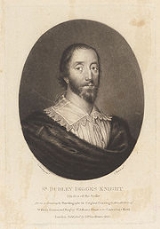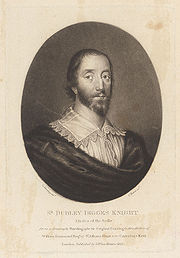
Dudley Digges
Encyclopedia

Chilham Castle
Chilham Castle is a manor house and keep in the village of Chilham, between Ashford and Canterbury in the county of Kent, England. The polygonal Norman keep of the Castle, the oldest building in the village, dates from 1174; still inhabited, it was said to have been built for King Henry II...
, Kent
Kent
Kent is a county in southeast England, and is one of the home counties. It borders East Sussex, Surrey and Greater London and has a defined boundary with Essex in the middle of the Thames Estuary. The ceremonial county boundaries of Kent include the shire county of Kent and the unitary borough of...
(which he completed in 1616), was a Member of Parliament
Member of Parliament
A Member of Parliament is a representative of the voters to a :parliament. In many countries with bicameral parliaments, the term applies specifically to members of the lower house, as upper houses often have a different title, such as senate, and thus also have different titles for its members,...
, elected to the Parliament of 1614
Addled Parliament
The Addled Parliament was the second Parliament of England of the reign of James I of England , which sat between 5 April and 7 June 1614...
and that of 1621, and also a "Virginia adventurer," an investor who ventured his capital in the Virginia Company of London. Among the "planters," who emigrated in the 1640s, was Digges's son Edward
Edward Digges
Edward Digges was a British barrister and colonist who served as Colonial Governor of Virginia from March 1655 to December 1656...
, who became Governor of Virginia
Governor of Virginia
The governor of Virginia serves as the chief executive of the Commonwealth of Virginia for a four-year term. The position is currently held by Republican Bob McDonnell, who was inaugurated on January 16, 2010, as the 71st governor of Virginia....
.
Life
Digges was the son of Sir Thomas DiggesThomas Digges
Sir Thomas Digges was an English mathematician and astronomer. He was the first to expound the Copernican system in English but discarded the notion of a fixed shell of immoveable stars to postulate infinitely many stars at varying distances; he was also first to postulate the "dark night sky...
, the mathematician, and Anne St Leger (d. 1636), daughter of Warham St Leger
Warham St Leger
-Life:He was second son of Sir Anthony St Leger by his wife Agnes, daughter of Sir Hugh Warham, brother of Archbishop William Warham, and was born probably about 1525. His eldest brother, William, was disinherited; the third brother, Sir Anthony St Leger, was made Master of the Rolls in Ireland in...
and connection of a branch of the Neville
Neville
Neville is a name that originates from place names in Normandy, from the Old French Néville "Néel's estate" or Neuville, meaning "new village" or "new town".Neville may refer to:-Places:*Néville, Haute-Normandie, France...
family.
He married Lady Mary Kempe, daughter and co-heir of Sir Thomas Kempe of Olantigh
Olantigh
Olantigh is a property one mile north of Wye in Kent, southeast England. It includes a garden of 20 acres . The hamlet in which the property stands is Little Olantigh....
, Kent. They had eight sons and three daughters. Besides Edward, another son, Dudley (c. 1612-1643) published a treatise on the Illegality of Subjects taking up Arms against their Sovereigns (1643).
Having graduated from Christ Church, Oxford
Christ Church, Oxford
Christ Church or house of Christ, and thus sometimes known as The House), is one of the largest constituent colleges of the University of Oxford in England...
, in 1601, Digges was knighted by James I
James I of England
James VI and I was King of Scots as James VI from 24 July 1567 and King of England and Ireland as James I from the union of the English and Scottish crowns on 24 March 1603...
at Whitehall
Whitehall
Whitehall is a road in Westminster, in London, England. It is the main artery running north from Parliament Square, towards Charing Cross at the southern end of Trafalgar Square...
on 29 April 1607.
He was a friend of Henry Hudson
Henry Hudson
Henry Hudson was an English sea explorer and navigator in the early 17th century. Hudson made two attempts on behalf of English merchants to find a prospective Northeast Passage to Cathay via a route above the Arctic Circle...
; in 1610 he was one of those who fitted out Hudson for his last voyage, in which Cape Digges and Digges Islands
Digges Islands
The Digges Islands are members of the Canadian Arctic Archipelago in the territory of Nunavut. The two islands, West Digges and East Digges, are located in Digges Sound, an arm of Hudson Bay, where the strong currents of the bay meet Hudson Strait.The hamlet of Ivujivik, on the Ungava Peninsula,...
were named for him. Later he backed the explorations of William Baffin
William Baffin
William Baffin was an English navigator and explorer. Nothing is known of his early life, but it is conjectured that he was born in London of humble origin, and gradually raised himself by his diligence and perseverance...
in 1615 and 1616, with several of the same group of "adventurers".
Digges was named ambassador
Ambassador
An ambassador is the highest ranking diplomat who represents a nation and is usually accredited to a foreign sovereign or government, or to an international organization....
to Muscovy in 1618-19 and Special Ambassador to Holland (1620). In the Parliament of 1621, he was active in the impeachment
Impeachment
Impeachment is a formal process in which an official is accused of unlawful activity, the outcome of which, depending on the country, may include the removal of that official from office as well as other punishment....
of the Duke of Buckingham
George Villiers, 1st Duke of Buckingham
George Villiers, 1st Duke of Buckingham KG was the favourite, claimed by some to be the lover, of King James I of England. Despite a very patchy political and military record, he remained at the height of royal favour for the first two years of the reign of Charles I, until he was assassinated...
during the crisis of 1626 that followed the aborted expedition to Cadiz
Cádiz
Cadiz is a city and port in southwestern Spain. It is the capital of the homonymous province, one of eight which make up the autonomous community of Andalusia....
, when Digges and Archbishop Abbot co-operated to coordinate the attacks in the Houses of Lords and Commons. Digges was for a time imprisoned in the Fleet Prison
Fleet Prison
Fleet Prison was a notorious London prison by the side of the Fleet River in London. The prison was built in 1197 and was in use until 1844. It was demolished in 1846.- History :...
by order of the King, but was released on apologizing to the King, an act that John Eliot
John Eliot
John Eliot may refer to:*Sir John Eliot , English politician*John Eliot , English Puritan minister and missionary*John Eliot, 1st Earl of St Germans , British politician...
was unwilling to perform. In 1630 he was appointed Master of the Rolls
Master of the Rolls
The Keeper or Master of the Rolls and Records of the Chancery of England, known as the Master of the Rolls, is the second most senior judge in England and Wales, after the Lord Chief Justice. The Master of the Rolls is the presiding officer of the Civil Division of the Court of Appeal...
.
In 1631 he was one of the commission appointed by the Privy Council
Privy Council of the United Kingdom
Her Majesty's Most Honourable Privy Council, usually known simply as the Privy Council, is a formal body of advisers to the Sovereign in the United Kingdom...
"to consider how the plantation of Virginia now standeth, and to consider what commodity may be raised in those parts," and subsequently (1634) was appointed Commissioner for Virginia Tobacco.
He left a fund in his will that provided, for some 200 years after his death, an annuity of £20 as prize money for races between the men and women of the parish of Chilham.
Works
Digges published several political and economic works, The Worthiness of Warre and Warriors (1604), The Defence of Trade (1615), Rights and Privileges of the Subject (1642), and, posthumously, The Compleat Ambassador: or Two Treaties of the Intended Marriage of Qu. Elizabeth of Glorious Memory (1655), a notable study of the two French marriage embassies, of Anjou and of Alençon, which revealed in unprecedented fashion the official despatches and correspondence and is a landmark in English historiographyHistoriography
Historiography refers either to the study of the history and methodology of history as a discipline, or to a body of historical work on a specialized topic...
.

